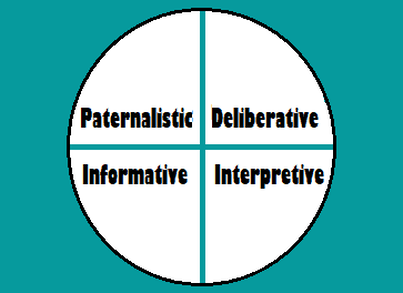News
|
Shape Divider - Style fan_opacity
|
Tips for Improving the Doctor-Patient RelationshipThree Key Factors in Effective |
|
Effective communication (both verbal and nonverbal) can positively influence a patient’s emotional health, symptoms, pain control, and even blood pressure levels. On the other hand, miscommunication can have severe negative implications.
There are several ways physicians can facilitate open communication with a patient:
2. Shared Decision-MakingMedical decisions must stem from a collaborative process between doctors and their patients. The patient should be involved in the decision-making process from the very beginning. This will ensure that the resulting decision reflects not only the doctor’s medical knowledge, but also the patient’s beliefs and values.
Shared decision-making should be applied to relatively small decisions as well as large one. For example, "I can write you a prescription to help with your symptoms, but I also suspect they’ll go away on their own if you wait a little longer. Which would you prefer: to try the medication, or to wait?" Studies show that collaborative decision-making correlates with increased patient satisfaction and loyalty. This type of patient empowerment also enables physicians to provide more personalized care. |
FOUR MODELS FOR THE
DOCTOR-PATIENT RELATIONSHIP In 1992, physicians Ezekiel and Linda Emanuel proposed four models for the physician-patient relationship: 1. Paternalistic – Physician acts as guardian, promoting the patient’s well-being independent of patient’s current preferences. 2. Deliberative – Physician acts as friend or teacher, articulating and persuading the patient of the most admirable values, as well as informing patient and implementing the patient’s selected intervention. 3. Interpretive – Physician acts as counselor or advisor, elucidating and interpreting relevant patient values, as well as informing patient and implementing the patient’s selected intervention. 4. Informative – Physician acts as competent technical expert, providing relevant factual information and implementing the patient’s selected intervention. Source: Journal of the American Medical Association |
When it comes to the physician-patient relationship, trust is fundamental. Patients must trust their doctors to work in their best interests in order to achieve the best outcome. In fact, research indicates that a patient’s trust in his doctor is even more important than his satisfaction with a particular medical treatment.
A 2017 joint study by Harvard Medical School and the University of Basel in Switzerland found that patients who trust their physicians have fewer medical complaints, feel better overall, and have a higher quality of life.
According to Department of Bioethics and Humanities at the University of Washington in Seattle, one-third to one-half of patients fail to follow a doctor's treatment recommendations. That’s because patients typically filter their doctor’s instructions through competing demands and their existing belief systems. Then they decide if the recommendations are desirable (or even possible) within the context of their everyday lives.
A 2017 joint study by Harvard Medical School and the University of Basel in Switzerland found that patients who trust their physicians have fewer medical complaints, feel better overall, and have a higher quality of life.
According to Department of Bioethics and Humanities at the University of Washington in Seattle, one-third to one-half of patients fail to follow a doctor's treatment recommendations. That’s because patients typically filter their doctor’s instructions through competing demands and their existing belief systems. Then they decide if the recommendations are desirable (or even possible) within the context of their everyday lives.
3. Doctor-Patient Trust
—Article Continues Below--
But patients who trust their doctors are more likely to follow the recommendations and instructions. And they’re also more likely to be satisfied with the quality of overall medical care, and to continue with that particular provider.
Doctor-patient trust hinges on many factors. Three of the most important are:
- The doctor’s willingness to listen
- The patient's belief that the doctor values his ability to make informed decisions
- The patient feeling comfortable engaging in health-related dialogue
Impact on the Future of Healthcare
As healthcare becomes more patient-centered and personalized, the doctor-patient relationship will increasingly shape medical outcomes. Understanding the factors that influence these relationships can help providers remove some of the potential barriers to this more personalized approach.
Sources:
Featured Image: Adobe, License Granted
Duke Personalized Health
Journal of the American Osteopathic Association
University of Washington Medicine
American Association for Physician Leadership
Featured Image: Adobe, License Granted
Duke Personalized Health
Journal of the American Osteopathic Association
University of Washington Medicine
American Association for Physician Leadership
Comments are closed.
Contact Information
Address2150 Lelaray Street
Colorado Springs, CO 80909 P.O. Box 140 Colorado Springs, CO 80901 |
ContactPhone: (800) 266-3809 / (719) 634-3760
Email: [email protected] Business Hours: Monday – Friday, 8am – 5pm Closed Sat/Sun |
Other Information |
Click to set custom HTML
©
2022 Reliant Financial Services LLC





